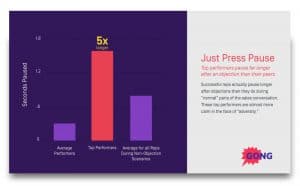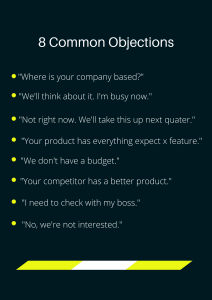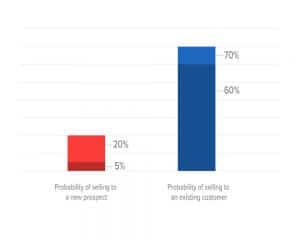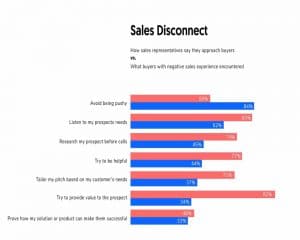Overcoming Sales Objections
Have you encountered a rebuttal from a lead during a sales process with reasons like “It’s too expensive” or “I don’t want this product now”? Don’t worry! Sales objections are common and they’re issues that a lead explicitly states to the sales reps as to why they can’t purchase from them at the moment.
And guess what? Whether you like it or not, a sales objection is inevitable. No wonder, almost 36% of salespeople say closing is the hardest part of their job.
“An objection is not a rejection; it is simply a request for more information”
– Bo Bennett
To counter this, as a sales rep, when prospects share their hesitation with you, you can turn their sales objections to your advantage.
Remember, there are many ways to address your prospects’ concerns if you approach it in the right way.
That’s why we’ve created a guide to the common sales objections you’re most likely to hear- along with a video script that will help you respond to each of them.
Broad classification of sales objections
Let’s begin by broadly classifying these sales objections type:
5 Most Common Objections To A Sale
Price Objection
Objections based on price are the most common as leads are apprehensive about the financial risk that is associated with making a purchase. A few of the price objections you’ll hear are “No budget”, “Price is too high” and “I need a discount to buy.”
Customers’ Trust Objections
People like to do business with those they know, like, and trust. And objections like “I’ve never heard of your company” shows they might be concerned about the legitimacy or credibility of you or your company.
“I do not have Time” Objections
You may hear objections like “I’m busy”, “Send the information in an email”, “Not now, maybe next quarter” etc. When faced with this objection, you need to keep up that conversational prowess at its best, or else you’ll end up losing the lead.
Sales Objections About the Competition
When a lead brings up a competitor comparison, it means they have a need for your product. It is on the lines of “ Your competitor’s product is better” or “Your competitor has more features” etc.
Sales Objections About Authority
The closer the sale is to closing, some leads drop in the ‘gatekeeper’ objection – “I’ll have to talk to my team/boss about this” or “I’m not the decision-maker” etc. It might be due to the pressure they feel or there might not be an urgency for your product.
4 Objection handling skills for responding to objections
Salespeople often get derailed when faced with an objection because of the surprise factor that accompanies them. The art of nailing every objection with confidence is to be prepared for it. Here are a set of strategies that you can follow:
Listen T
Your first reaction to an objection may be to jump right in and defend your product. Resist this temptation. According to a study conducted by Gong, they found that top sales reps paused 5x times longer after an objection when compared to unsuccessful sales reps.
Also, according to Web Strategies, 74% of buyers said they were more likely to buy from salespeople who would listen to them

Source: Webstrategiesinc.
Understand The Objection
Empathy is one of those sales tactics that just won’t grow old. Let the prospect know you understand how they feel, even if you might disagree with their objection. Try to ask as many open-ended questions as you can to better understand the objection and what’s motivating it. Only 13% of the customers believe that a salesperson can understand their needs. – source: Brevet. This is why empathy improves your close ratios.
Respond Properly
However petty their objection might seem to you, a salesperson must always have the lead’s best interest at heart. After you actively listen and understand their objection, it’s time to respond to it. If they have multiple objections, address the first concern, and then move on to the next one. Remember, you must do everything you can to clarify their objections since 70% of buying experiences are based on how the customer feels they are being treated.
Confirm
After responding to the objection, confirm you’ve addressed their concerns clearly. 58% of buyers report that sales reps aren’t able to effectively answer their questions, therefore ask them how they feel about what you’ve said or if they need further clarification. This will help you move in for the close.
How To Overcome 8 Common Sales Objections
Now that we’ve looked into what sales objections are and how to handle objections, it’s time to talk about common objections and how you can tackle them.

Objection 1: “Where is your company based? I’ve never heard of your company”
When you’re faced with an objection like this, it’s understandable that the prospect has trust issues and the objections can range from skepticism about your company’s reputation to how long you’ve been in the market.
Businesses have 60-70% chances of selling to an existing company while the probability of selling to a new customer is only 5-20%!

Source: Superoffice
Remember, this is not the time to take offense. Instead, sales reps should see them as an opportunity to position the company in a positive light.
This is why, when a prospect throws up a trust objection, treat this objection as a request for information and reassurance that your product is going to work for them.
How you can tackle it:
Mark (Salesperson): Hi Jessica! I’m Mark from the sales department at Ace Media. Thank you for joining me today. I saw your company just got announced as one of the top B2B SaaS companies to watch in 2020. Big congratulations!
Jessica (Prospect): Yes, we’re super thrilled about it. Thank you for your wishes! We appreciate it.
Mark: Don’t mention it. So we at Ace media recently launched a new set of solutions designed specifically to help support teams drive success by working with videos. Do you have a couple of minutes to spare so I can briefly show you how we could collaborate?
Jessica: Well, just before we had a conversation, I realized I’ve never heard of your company. Are you guys new in the market?
Mark: I understand why you’re asking and it’s completely valid. Let me explain – We’re a web-based B2B software company that helps support reps resolve customer tickets using video support, and so far we’ve helped more than 50+ companies including your competitor’s Team support solutions and Choice solutions improve their customer experience like no other.
Jessica: Oh, I see. That’s interesting.
The only way to defeat an objection about trust is to always provide them with a very quick summary of your value proposition. This will help them understand that you mean business and have customers who trust your company and that your product works.
Objection 2: “We’ll think about it. I’m busy right now”
If a prospect pops the ‘I’m busy right now’ objection, it often means there is a certain level of uncertainty they’re experiencing about your solution. According to a research report on ‘Sales from the buyers perspective 2018’ it was found that 58% of B2B buyers distrust the integrity of sales reps.

Source: Training industry
To tackle this, find out what is causing this uncertainty in them – maybe it’s a pain point they have and yet to be discussed or you’re yet to explain your offer in clearer terms.
Here’s how you can handle it:
Jessica: Oh, I see. Well, we’ll think about it. Your product sounds great, but I’m too busy right now to put in the effort required to implement a new process.
Mark: I understand. If it’s alright, may I know how many hours your team spends every day on resolving customer complaints?
Jessica: Due to the sheer volume of customer inquiries we receive, our support team spends a considerable amount of time as a huge part of these questions are repetitive.
Mark: Sure, I get it. It was a concern for our XY customer and ABC customer. As a solution, they used our product and reduced their ticket response rate from a couple of hours to a matter of minutes by resolving tickets using videos. And what’s more? It typically takes our customers less than a day to get fully up and running with our software.
A response like this where you ask them their pain points and build your conversation around it helps to build a stronger rapport with your prospects as it demonstrates confidence in your solution.
Also, pull out case studies and success stories from your current customers, so that you can show them real results. This will offer objective proof that many customers have trusted your company and that your product works.
Objection 3: “Not right now. We’ll take this up sometime later, maybe next quarter”
This objection directly implies that the prospect is expecting some change in the organization such as a shift in the organizational structure, or another business objective is taking priority.
On a regular day when you face an objection like this, you might be tempted to say “Sure, Jessica, I understand you need some time to think this through. How about I call you in a couple of days?” And that’s exactly what your prospect is looking to achieve – they want to politely postpone the conversation.
According to the Ebbinghaus ‘Forgetting curve’, you’ll remember only 58% of what you’ve learned within the first 20 mins and 33% within the first day.

Source: Intela Learning
Therefore, if you agree to postpone the meeting, chances are high your prospects will forget what you’ve told them in the previous meeting.
You can tackle it this way:
Jessica: Not right now. Let’s take this up maybe next quarter.
Mark: I understand your concern about committing to a new solution. However, you had pointed out earlier that your customer support team was currently facing hiccups in resolving tickets on-time.
Does this mean you’re happy with the current situation? Or do you plan to deal with it on your own at a later stage? This will help me understand a bit more about your approach to the situation.
To handle this objection, re-establish with your prospect their pain point and illustrate the pain of not taking action. When you ask a prospect a similar question, you’re putting them in a position where they feel they need to answer since it’s a reasonable one.
Objection 4: “Your product has everything except x feature we’re looking for”
When a prospect uses this objection, it can mean two things: either they’re genuinely looking for a solution with that particular feature or they still think your product is simply a ‘nice to have’ solution and they’re yet to be convinced.
In the latter case, your team must align on what types of product changes you will or will not pursue in a given time frame.
But if they’re using it as a smokescreen, the way to get your prospect to shift into the ‘must-have’ field is by helping them understand the positive impact your product will have on their pain point.
The key is to install a sense of urgency that their pain point does need to be fixed and your product is the best way to do that.
Take a look at the chart below to see 42% of sales reps feel establishing ‘urgency’ is something they struggle with the most.

HubSpot Sales Perception Survey, Q1 2016
Here’s how you can tackle it:
Jessica: Well Mark, I’m interested in your product, but I see that it doesn’t offer our support team the convenience of booking meetings with customers directly from the solution. So I’m just not sure about it.
Mark: Could you shed some light on how this feature would be of use to you?
Jessica: Oh yes! Currently, our team switches between tabs to schedule meetings with our customers and resolve the tickets. It seems a bit hectic for them.
Mark: Perfect! I guess we have the right solution to your concern. Our tool is integrated with Calendly which helps you to directly book meetings without having to switch tabs. And what’s more, it will also send you periodic reminders about your scheduled meetings so you don’t miss out.
As shown in this above example, ask the prospect where they struggle and then paint a picture of bridging that with your product. In a situation where your product is missing the feature requested by the prospect, try suggesting a supplementary product that can be used in conjunction with yours.
Objection 5: “We don’t have the budget since our company is cutting down on costs”.
Price objections come up for a variety of reasons. They can mean your prospect truly is on a budget restriction and they’re unable to afford your product at the given time frame.
In this case, it is best to flag them as a cold lead and not waste your time trying to find an innovative way for them to afford your product.
On the flip side, when budget or price is raised as an objection from an already qualified lead, it means you haven’t demonstrated enough value for the cost you’re quoting, or your prospect is not educated about how to purchase in your category.
According to Marcwayshak, 55% of respondents said that budget was the most common reason that sales opportunities fell apart.

Source: Marcwayshak
So to convince your prospect, you need to reframe the conversation to focus on the value proposition instead of the cost.
Here’s how you can tackle it:
Jessica: Your product is expensive and we’ve already allocated budgets for this year.
Mark: Your concerns are valid. I get it. But let me ask you: if the price weren’t an issue, would you still move forward with us today?
Jessica: Yes, we would have certainly considered your product as it looks promising.
Mark: Well, since you mentioned your support team is having a tough time keeping up with the huge quantities of customer tickets, our solution is going to free up a lot of time for your team to focus on other important tasks.
We’re also confident that in the long run, this investment will increase your team’s efficiency, thus helping you save money and enjoy a massive ROI.
When handling a pricing objection, respond with confidence that your pricing strategy is well-researched and in line with the market pricing, and therefore justified.
Also, refrain from saying things like “I don’t think it’s too expensive” or “Product price isn’t that much when you think about it”.
Objective 6: “Your competitor has a better product and is cheaper”
When a prospect throws this objection at you, ask them if they’ve already entered into a contract with your competitor. If not, enquire about the factors why they prefer the competitor over you.
Does the prospect think that a cheaper solution has what they need? If so, it’s time to put on your detective hat and dig deep into the comparison.
The key is to highlight the unique benefits your product has, that nobody offers. But whatever you do, never bad-mouth your competitor as it will look unappealing.
Sometimes, a prospect might drop this objection in the hope of scoring a discount.
To tackle this, sell your prospect on the value that your solution provides and list other businesses who are in the same field as your prospect who have used your product successfully.
Here’s how you can tackle it:
Jessica: Your competitor is offering a better product for half the cost.
Mark: That’s good to hear! Acute Solutions [competitor] is a great company. We have customers who’ve previously used their product and find that our product makes answering customer questions much easier via integrated email, and a complete database that keeps all your customer contact and helps desk ticket information in one place.
While addressing this question, you should frame your conversation in terms of what they’ll lose if they don’t buy your product, as opposed to what they’ll gain if they buy your product. It’s simply because people hate to lose things!
Objection 7: “I need to check with my boss. Also, please send me more information to send it to my management”
Prospects resort to this objection when they’ve either made up their mind (prematurely) about you and want to cut the conversation short or they’re interested in your product and want to convince their management.
A seasoned salesperson will see right through it and can gauge their intention.
But if you send them your marketing material, you’re basically surrendering the deal. So what do you do? Agree to send them the information, but don’t end the conversation there.
Instead, if you’ve qualified this lead, ask them open-ended questions about their key stakeholder.
Here’s how you handle it:
Jessica: Mark, I need some time before we take the next step. I need to check with my boss about your product. Meanwhile, it would be great if you could email me more information that I can share with my team.
Mark: Sure, I’d be happy to email our information over to you. Jessica, can I answer any of your questions before you discuss our product with your stakeholders? Is there anything they will want to know specifically about?
Jessica: Sure. Our CEO is very specific that the product should be cost-effective owing to budget constraints.
Mark: Well, I’d love to meet with your stakeholders over a video call so I would have the opportunity to discuss personally our product offerings. Can you kindly connect us?
Jessica: I think that can be done. I’ll send you an email with the meeting schedule.
Requesting the prospect about having a call with the key stakeholder is a great way to show them you genuinely care about helping them out, and not just sell to them.
Objection 8: “No, we’re not interested”
Sometimes, no just means “No”. The key to dealing with this objection is knowing when to walk away. This is because there is always a thin line between helping your prospect and annoying them.
According to Crunch base, 50% of sales reps feel they were trying to provide value to the prospect, but 84% of prospects felt the reps were being too pushy.

Source: Crunch base
At the end of the day, however hard you try, some people are never going to be a good fit for your product. And that’s ok.
But don’t give in so easily. Before you close the conversation, it’s important to take the opportunity to learn, and find out more about why they said “no”. Maybe you’re approaching the wrong customer, or maybe you failed to make them understand the value your product provides, or maybe they’re just not ready yet.
Here’s how you can handle it:
Jessica: Mark, currently we feel our business is going well and there is no need for your product.
Mark: So does that mean you’re no longer trying to fix the delay your support team has been facing to solve customer tickets? I’m sure you still want to solve this problem.
Jessica: Well, to be frank, we are happy with our existing system. Also, our priorities are quite different at the moment, so when we strongly feel a need to look into the support team, we’ll take it up. Right now, we’re not interested.
Mark: Sure Jessica. It was great talking to you. Remember, if you need any assistance, I and my team are just an email away. You can always contact us.
When a prospect says a hard “no” and closes the conversation, don’t simply forget about them. Instead, store their information in your closed-lost follow-up. Also, use their feedback to brainstorm with your team about new ways to deliver or show value.
How does a good salesperson tackle objection?
We’ve discussed how to tackle each objection along with some tips that’ll come handy. But let’s face it, most salespeople are selling similar products to similar audiences. So how do you increase your efficiency? Simple: create an action plan for each sales objection. Here’s how you can do it.
Anticipate objections:
There’s nothing worse for a business than a salesperson who hopes an objection won’t come their way. Always anticipate it and make a plan for any likely objections so you’re prepared about how to approach your response accordingly.
To do this:
- Write down a list of all the common objections you hear every day.
- Next, look at all the past lost opportunities and figure out why you couldn’t close them.
- Once that’s done, think about what you should be doing differently in the future.
The goal here is to stay prepared much before any objection comes your way.
Stay calm when overcoming objections:
As humans, it is common to react with a knee-jerk-monologue when faced with an objection. But what differentiates a good salesperson from the rest is the way they handle a negative situation.
Answering questions with a “Your boss said no?” “The price is too high?” can create friction. Instead, stay calm, take a deep breath, and make sure you’re listening to your prospect’s objection.
You can take control of your situation by asking questions like “Can you help me understand what’s causing this concern?”. Doing this will help you empathize with them and get them to talk about their concerns with you, so you can help them better.
Brainstorm:
Teamwork is always important for the success of a sales team. If you see your sales team is having a difficult time coming up with creative solutions to tackle objections, pool in everyone’s ideas together. This will help you talk about each other’s ideas on how to close successfully, so they can replicate them.
Conclusion
Sales and objections go hand-in-hand. They help you understand your prospects better – their pain points and how your product can help them.
But before you learn to tackle sales objections, it is important to understand there are different types of leads you’ll face in your sales process. Here’s how to classify them:
- The head-nodder – These clients have no objection regarding your proposal. Sadly, they are very rare to come across.
- The tough cookie – These clients have many reservations regarding your proposal and can ask you a zillion questions. Stay calm and try to understand why your prospect is stating these objections. If you get this objection handling skill right, you might easily win them over as not every salesperson takes the time to truly understand them.
- The naysayer – This group can be tricky as they can avoid any interaction with you. They might object saying they don’t need your product. But if you pitch them a good proposal, it will help bring them onboard.
A good salesperson not only hones his objection handling skills but is also quick to identify the leads and pitch accordingly. After all, not every lead is the same. Identify the ones that need a bit of nudge from the ones you have to part ways.
Are you ready to crush your quota?



